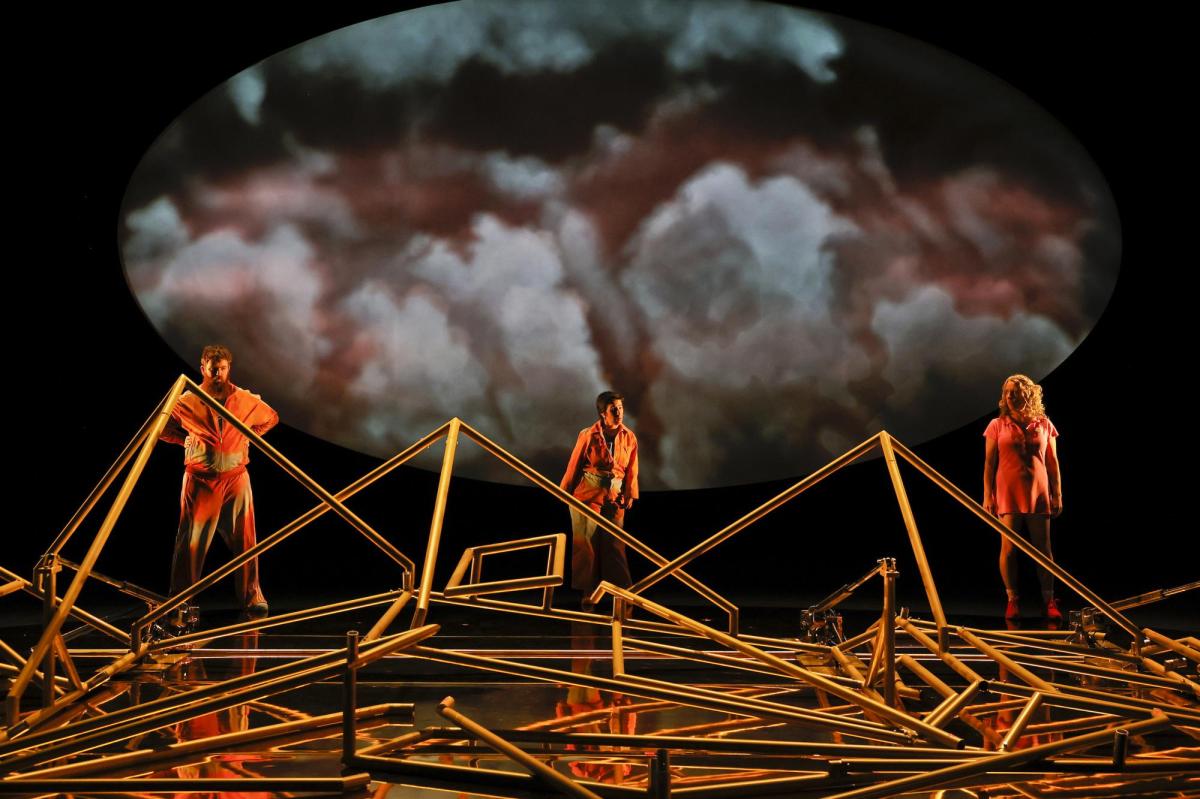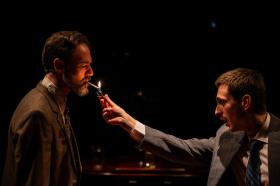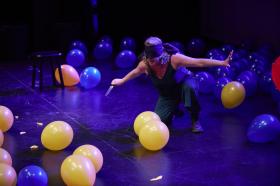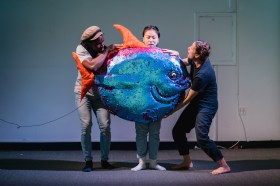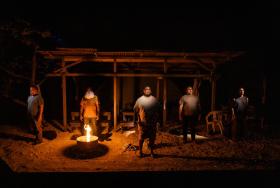Multiple Bad Things is Geelong-based Ibsen Award-winning theatre company Back To Back Theatre’s latest theatrical work, premiering at the Merlyn in Melbourne’s Malthouse Theatre. The play of tension and black humour so successfully employed by this company, and a hallmark of their work, is already manifest as the audience walks into the space – which grows, shifts and changes throughout the play.
Back To Back Theatre works with actors who have disability and, similarly with their previous works, Multiple Bad Things explores ideas that force the audience to reckon with complex philosophical or ethical questions, layering in the intersectional experience of people with disability.
In Multiple Bad Things, Back To Back brings together actors Bron Batten, Simon Laherty, Sarah Mainwaring and Scott Price, to explore ideas of power and privilege. The set and costume design, ominous sound design of deep rumbling bass and hollow tinkling echoes, and the sense of space and pace throughout work together to create the sense of Kafkaesque dystopian farce.
Anna Cordingley’s set has four parts, spread across the black box stage and inviting questions. An enormous construction of interconnected gold metal poles occupies the central space. A massive oval screen, metres across, is set at the back of the stage. On it appear dark clouds – also used throughout the play to project the text of the characters’ speech. To the left of the stage, a messy work desk sits, the computer screen displaying a game of solitaire. To the right, a large, blow-up flamingo rests.
Laherty, enters the space, dressed in a kilt, sporran, knee-high socks and a tie-dyed jacket. He tells us that theatre is not real. That what we will see includes violence, a fight, abusive language. He tells us that we are warned. The audience titters. He sits at the computer desk, where he remains throughout the play, as the action in the centre of the stage unfolds – sometimes walking across the stage to collect a snack or a bottle of cola, sometimes turning to the audience and gifting us with an aphorism, many of which only open up more questions, further pulling on that wire of tension. ‘People are mean because they’re hurting. They’re afraid of themselves,’ he says at one point. At another, he repeats: ‘Theatre is not real.’ Whether prophet or guide, or disconnected foreman of this post-apocalyptic worksite at the centre of the stage, his presence throughout anchors the action, hinting at a world outside.
Three characters arrive to this strangely absurd worksite, their job apparently to put together a confusion of poles – the sculpture a seemingly pointless mess. One of the three, the only man on-site, plonks down on the flamingo. He scrolls on his phone, not helping. Another character, inhibited in her movement due to her physical disability, moves slowly and carefully – the complex pole structure a Herculean task before her. The third performer scoots in on a child’s scooter, her deft physicality in stark contrast to the other woman working on the pole problem.
The tension begins to build as the able-bodied woman employs condescending language and thoughtless actions towards her disabled workmates. At one point she leaves her colleague hanging, who is painstakingly holding a heavy pole, asking repeatedly for help. At another, she looms over her colleague on the flamingo, before letting out the blow-up seat’s air. ‘It was just a joke,’ she says – the calling card of a bully.
In another scene, the able-bodied character tells the character on the flamingo that she identifies as ‘diverse’, setting him off into a rage – who is she to claim ‘diversity’, he says, when she cannot know what it’s really like to live as someone with an overt disability? ‘It’s not a competition,’ the able-bodied woman counters, as the man – who we learn has autism – collapses in a heap at the back of the stage, in abject distress.
In our current time, where a growing trend of able-bodied people are being diagnosed with ASD (autism spectrum disorder), this scene is particularly hard-hitting, seemingly asking the question – how does this diagnostic trend serve to occlude the intersectional challenges of the neurodiverse who present with disability?
Read: Theatre review: Ink, New Theatre
Multiple Bad Things has been co-devised by the actors, together with a group of devisers and directors Tamara Searle and Ingrid Voorendt, to create a work that pushes audiences to see differently. It’s riveting theatre that plays so brilliantly with space and tension – another Back To Back winner.
Multiple Bad Things
Malthouse
Devisers: Bron Batten, Breanna Deleo, Natasha Jynel, Simon Laherty, Sarah Mainwaring, Ben Oakes, Scott Price, Tamara Searle, Ingrid Voorendt
Directors: Tamara Searle, Ingrid Voorendt
Composer and Sound Designer: Zoë Barry
Set and Costume Designer: Anna Cordingley
Lighting Designer: Richard Vabre
AV Designer: Rhian Hinkley
Helpline Voiceover: Rachel Griffiths
Script Consultant: Melissa Reeves
Creative Development: Michael Chan, Mark Deans, Alana Hoggart, Francesca Neri, Tamika Simpson
Set Construction: Kinetic Sets
Screen Construction: Reveal Productions
Scenic Art: Patrick Jones
Stage Manager: Alana Hoggart
Production Associate: Jordi Edwards
Sound Engineer: Peter Monks
Cast: Bron Batten, Simon Laherty, Sarah Mainwaring, Scott Price
Multiple Bad Things will be performed until 9 June 2024.
